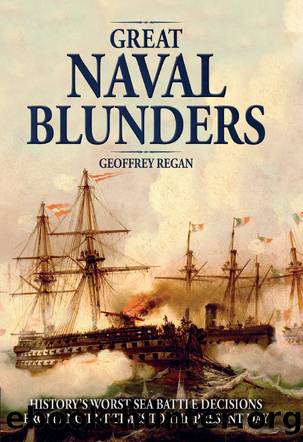Great Naval Blunders (9781780120508) by Geoffrey Regan

Author:Geoffrey, Regan [Regan, Geoffrey]
Language: eng
Format: epub
Publisher: Carlton Books Ltd
Published: 2012-10-14T16:00:00+00:00
Roderick Random and Jenkinsâ Ear
The English author Tobias Smollett undertook some interesting field research for his novel Roderick Random by serving as an assistant surgeon in Admiral Vernonâs fleet when it attacked the Spanish American port of Cartagena in 1741. Smollett â or, as we shall call him from now on, Random â thus had first-hand experience of one of the most disastrous amphibious operations of the century. Ignoring the evidence from Admiral Hosierâs expedition to Porto Bello in 1726 â and presumably not even reading the contemporary poem Admiral Hosierâs Ghost, which gave a ghastly warning to those who spend too much time in the pestilential Caribbean â the British Admiralty, at the insistence of Vernon â known far and wide as âthe angry admiralâ â sent a strong expedition to attack Cartagena and restore British prestige on the Spanish Main. As to why it needed restoring we must refer to a British captain named Robert Jenkins.
In 1739, Jenkins had been asked to attend the House of Commons, bringing with him a nasty looking object â his mummified ear â in a glass bottle. According to the good captain, he had lost this ear at the hands of Spanish privateers, who first half-hanged him and then cut off the ear, bidding him present the bleeding object to his king â George II â with their compliments. This insult was all that the opponents of the government needed to embarrass the âpeace-partyâ of Sir Robert Walpole. Spanish privateers had long preyed on British merchants in the Caribbean and the time had come to teach the Spaniards a lesson. The House of Commons buzzed with delight and Captain Jenkinsâ ear became the pretext for war against Spain. On 19 October 1739, hostilities were declared, and as Londonâs bells pealed out, Robert Walpole observed ruefully, âThey may ring their bells now, they will be wringing their hands before long.â
The responsibility for carrying the war into the Caribbean rested with Admiral Edward Vernon, who convinced the British government that a blow against Cartagena would weaken Spainâs influence and trade, force her to open her harbours to British traders, and deprive her of Peruvian bullion. To carry out the attack Vernon estimated that he would need some 9,000 British and American troops to capture the city and hold it. In addition, he feared that a combined Franco-Spanish fleet of 30 ships might oppose him in the Caribbean and so he would also require the strongest fleet that could be assembled. But after a long period of peace Vernon might as well have asked for the moon, for the navy was very short of seamen. Although by mid-August 1740 the contingent of 6,000 British troops were ready aboard the transports they were kept in port by shortages of naval personnel. There was no alternative but for General Cathcart, commander of the land forces, to turn over two of his line regiments and 600 of his new marines, to act as sailors for the duration of the voyage.
Download
This site does not store any files on its server. We only index and link to content provided by other sites. Please contact the content providers to delete copyright contents if any and email us, we'll remove relevant links or contents immediately.
| Africa | Americas |
| Arctic & Antarctica | Asia |
| Australia & Oceania | Europe |
| Middle East | Russia |
| United States | World |
| Ancient Civilizations | Military |
| Historical Study & Educational Resources |
Magic and Divination in Early Islam by Emilie Savage-Smith;(1531)
Papillon by Henry Charrière(1418)
Bohemians, Bootleggers, Flappers, and Swells: The Best of Early Vanity Fair by Bohemians Bootleggers Flappers & Swells- The Best of Early Vanity Fair (epub)(1394)
Ambition and Desire: The Dangerous Life of Josephine Bonaparte by Kate Williams(1380)
Twelve Caesars by Mary Beard(1310)
Operation Vengeance: The Astonishing Aerial Ambush That Changed World War II by Dan Hampton(1155)
What Really Happened: The Death of Hitler by Robert J. Hutchinson(1154)
London in the Twentieth Century by Jerry White(1141)
The Japanese by Christopher Harding(1129)
Time of the Magicians by Wolfram Eilenberger(1125)
Twilight of the Gods by Ian W. Toll(1110)
Lenin: A Biography by Robert Service(1072)
The Devil You Know by Charles M. Blow(1019)
A Social History of the Media by Peter Burke & Peter Burke(966)
Freemasons for Dummies by Hodapp Christopher;(960)
Napolean Hill Collection by Napoleon Hill(936)
Henry III by David Carpenter;(919)
The Churchill Complex by Ian Buruma(906)
The Rise and Triumph of the Modern Self by Unknown(904)
